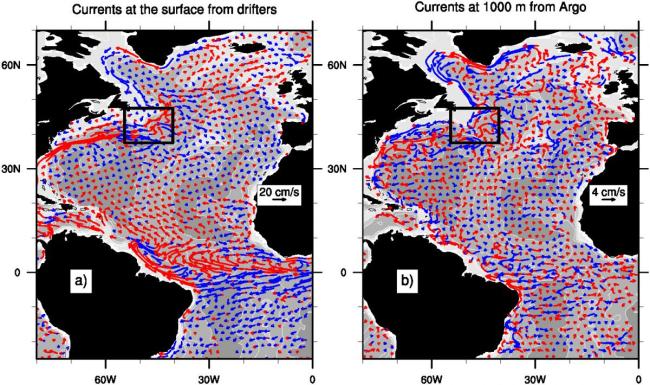The AMOC: its role in climate and its mechanisms of variability
The Atlantic Meridional Overturning Circulation (AMOC), a large-scale circulation pattern in the Atlantic, plays a central role in climate through its heat and freshwater transports. Northward ocean heat transport achieved by the AMOC is responsible for the relative warmth of the Northern Hemisphere, compared to the Southern Hemisphere, and is thought to play a role in setting the mean position of the Inter-Tropical Convergence Zone north of the equator. The AMOC is a key means by which heat anomalies are sequestered into the ocean’s interior and thus modulates the trajectory of climate change. Fluctuations in the AMOC have been linked to low-frequency variability of Atlantic sea surface temperatures, termed Atlantic Multidecadal Variability, with a host of implications for climate variability over surrounding landmasses. Interannual-to-decadal prediction systems—currently under-development—suggest that slow ocean variations, such as the AMOC, may be predictable.

Mean currents at (left) the surface from the Global Drifter Program (Lumpkin et al., 2013) and (right) a depth of 1000 m from the ANDRO dataset (Ollitrault and Rannou, 2013) derived from Argo float displacements. Vectors with northward velocities are shown in red and vectors with southward velocities are shown in blue. Note the scale for the vectors located over Africa. Bathymetry is shaded in grey, with lighter (darker) colors indicating shallower (deeper) regions. The white contours are at levels of 1, 2, 3, and 4 km. The black box indicates the transition zone. Figure courtesy of Nicolas Barrier (OT-MED Labex).
Despite its importance, the mechanisms that control variations in the strength of the AMOC are not well understood. On intrannual timescales, variability in AMOC is large and primarily reflects the response to local wind forcing. On decadal timescales, AMOC variability involves a complex interplay between wind-driven and thermohaline (buoyancy-driven) processes. Buoyancy anomalies on the western boundary are key to decadal AMOC variability, but the origin of these buoyancy anomalies and how they are communicated meridionally is not clear. This new paper by Buckley and Marshall proposes that a pacemaker region for decadal AMOC changes is located in a western “transition zone” along the boundary between the subtropical and subpolar gyres. From this region, decadal AMOC anomalies are communicated meridionally. If the transition zone indeed controls decadal AMOC variability, monitoring this region may enable scientists to measure and perhaps predict AMOC variability, with potential impacts for interannual-to-decadal climate predictions.
Observations, inferences, and mechanisms of Atlantic Meridional Overturning Circulation variability: A review (Reviews of Geophysics)
1George Mason University
2Atmospheric and Environmental Research
3Massachusetts Institute of Technology
Topics
- Atlantic Ocean
- Climate Change
- AMOC
